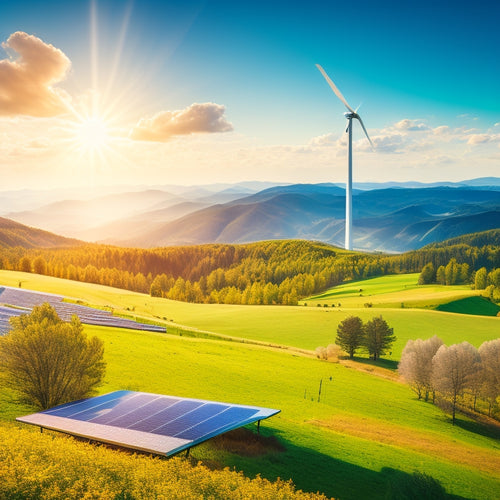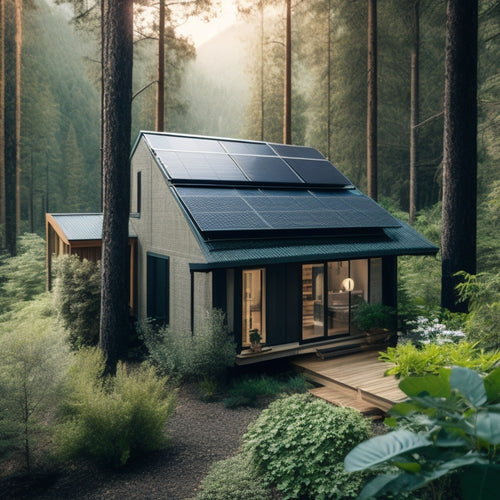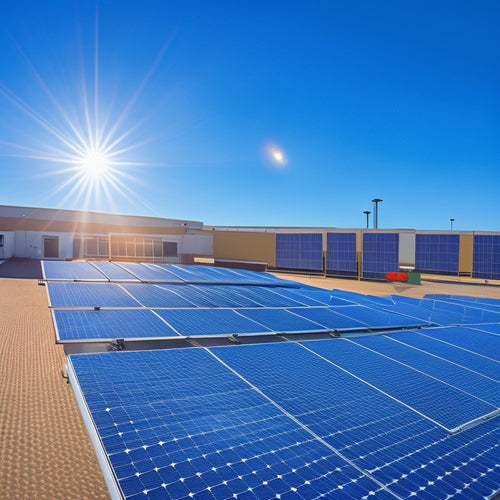
Achieve Energy Independence at Home
Share
By changing to renewable energy sources, such as solar power and battery storage, you can greatly reduce your reliance on the grid and fossil fuels, cutting your energy bills by up to 80% and mitigating the impact of fluctuating energy prices. This shift not only saves you money but also reduces your carbon footprint and greenhouse gas emissions. With smart technologies and energy-efficient appliances, you can optimize your energy distribution and consumption. By understanding your energy usage patterns and making data-driven decisions, you'll be well on your way to achieving energy independence - and there's even more to investigate to guarantee a seamless and sustainable change to energy self-sufficiency.
At a Glance
- Invest in renewable energy sources like solar panels and battery storage to reduce reliance on the grid and lower energy bills.
- Adopt energy-efficient appliances and practices to minimize energy consumption and extend the lifespan of renewable systems.
- Assess and optimize energy usage through monitoring and tracking to identify areas for improvement and reduce waste.
- Ensure optimal installation and maintenance of renewable energy systems to maximize energy harvesting and minimize losses.
- Combine eco-friendly energy solutions with smart technology to achieve energy independence and reduce carbon footprint.
Renewable Energy Saves Money
You'll see significant reductions in your energy bills by shifting to renewable energy sources, which can save you hundreds or even thousands of dollars per year.
By generating your own clean energy, you'll reduce your reliance on the grid and lower your energy costs.
With our all-inclusive Solar Panel and Battery Packages, you can utilize the power of the sun and store excess energy in a battery system, providing a reliable and renewable source of energy.
In the long run, the initial investment in renewable energy systems will pay for itself through these savings.
Lower Your Bills
Lowering your energy bills is a considerable advantage of adopting renewable energy sources at home. By shifting to renewable energy, you'll reduce your reliance on the grid and enjoy lower energy costs.
One effective way to achieve this is by investing in energy efficient appliances. These appliances, such as LED bulbs and Energy Star-rated refrigerators, consume considerably less energy than traditional models.
Additionally, installing house solar panels can further reduce your energy bills by utilizing the power of the sun.
Furthermore, smart home technology can help you optimize your energy usage by detecting areas of inefficiency and providing real-time feedback. For instance, smart thermostats can learn your schedule and preferences to minimize heating and cooling when you're not home.
Reduce Energy Costs
Freedom from the grid comes with a tangible financial benefit: reduced energy costs. By utilizing renewable energy, you're no longer bound to the fluctuating prices of fossil fuels. This shift to energy independence translates to significant cost savings over time.
By investing in Solar Power and Battery Storage solutions, you can enable yourself to break free from reliance on the grid and reduce your electricity bills, allowing you to reap significant cost savings while taking control of your energy needs Renewable Energy Solutions.
Renewable energy systems, such as solar and wind power, require minimal maintenance and have a long lifespan. This means you'll spend less on upkeep and replacement costs. In addition, the energy you produce is free, reducing your reliance on the grid and subsequently, your energy bills.
Investing in energy-efficient appliances and optimizing your home's energy consumption also contribute to substantial cost savings. By reducing your energy consumption, you'll lower your energy bills and extend the lifespan of your renewable energy system.
With energy independence, you'll enjoy a significant reduction in your energy costs, freeing up resources for other aspects of your life. By making the switch, you'll reap the rewards of energy efficiency and cost savings, achieving true freedom from the grid.
Reduced Carbon Footprint Guaranteed
You'll greatly reduce your carbon footprint by adopting eco-friendly energy solutions, such as solar or wind power, which are designed to minimize environmental impact.
By integrating residential solar power systems into your home, you'll not only generate renewable energy but also save on electricity bills with efficient and durable house solar panels.
By integrating these solutions into your home, you'll lower emissions today, contributing to a cleaner and healthier environment.
With a reduced carbon footprint, you'll not only minimize your impact on the planet but also set a positive example for others to follow.
Eco-Friendly Energy Solutions
Your home's reliance on fossil fuels can be greatly reduced with eco-friendly energy solutions, guaranteeing a reduced carbon footprint.
By integrating solar energy and wind power, you can generate clean electricity on-site. Energy storage systems, like battery systems, enable you to store excess energy for later use, reducing your reliance on the grid.
Smart technology optimizes energy distribution, ensuring maximum efficiency. Conducting energy audits helps identify areas of improvement, allowing you to implement sustainable practices and optimize home insulation.
Energy monitoring systems provide real-time data, enabling you to make informed decisions about your energy usage.
Lower Emissions Today
Lower Emissions Today
Implementing eco-friendly energy solutions in your home results in a significant reduction in greenhouse gas emissions, leading to a smaller carbon footprint. By shifting to renewable energy sources, such as solar, wind, or geothermal power, you'll drastically cut down on your reliance on fossil fuels. This change will lead to a substantial emission reduction, making your home a more environmentally friendly space.
You can further minimize your carbon footprint by optimizing your home's energy efficiency. Conduct an energy audit to identify areas of energy waste, and invest in energy-efficient appliances, insulation, and windows.
These upgrades won't only reduce your energy consumption but also lower your energy bills.
Inverter Converts DC Power
You'll need an inverter to convert the DC power generated by your renewable energy source into AC power, which is what your home's electrical system uses.
This conversion process is essential, as it guarantees you get efficient power output that's compatible with your appliances and devices.
With a reliable grid integration system in place, you can enjoy a seamless shift to renewable energy.
The inverter's ability to convert DC to AC power efficiently is what makes energy independence at home a reality.
DC to AC Conversion
As the energy harvested from solar panels or wind turbines is stored in batteries, it exists in the form of direct current (DC) power. However, most household appliances require alternating current (AC) power to function. This is where DC to AC conversion comes in. You'll need an inverter to convert the stored DC power into AC power, making it compatible with your appliances.
When selecting an inverter, consider the type of DC applications you'll be using. For instance, if you have a solar panel system, you'll need an inverter that can handle the DC voltage output of the panels. Look for an inverter with high AC compatibility to guarantee it can handle the voltage and frequency requirements of your appliances.
The conversion process involves the inverter switching the DC power at high frequencies to create an AC waveform. This waveform is then filtered and altered to match the voltage and frequency of your grid-tied system or standalone appliances.
With the right inverter, you can enjoy reliable AC power from your DC energy storage, taking you one step closer to energy independence.
Efficient Power Output
Your inverter's efficient power output is essential to guaranteeing that the converted AC power meets the requirements of your appliances. This means that the inverter must be able to optimize power output to match the specific needs of your energy storage system and the devices you're powering.
To achieve this, modern inverters employ advanced power optimization algorithms that continuously monitor and adjust output to assure maximum efficiency.
When it comes to energy storage, efficient power output is vital to maximizing the lifespan and capacity of your batteries. By minimizing energy losses during conversion, you can store more energy and reduce the strain on your system. This, in turn, allows you to enjoy a more reliable and sustainable source of power.
To optimize power output, look for inverters with high efficiency ratings, typically above 95%. Additionally, consider inverters with built-in monitoring and control capabilities, which can provide real-time data on your system's performance and allow you to make adjustments as needed.
Assess Your Energy Demands
You need to understand your energy usage patterns to determine the size of the renewable energy system required to meet your daily energy consumption.
Start by tracking your energy usage over a week or a month to identify peak periods and appliances that consume the most energy. This is essential in optimizing your energy efficiency and finding the right energy storage systems for your home.
Energy Usage Patterns
Identifying your energy usage patterns is essential to achieving energy independence at home. To do this, you'll need to assess your energy efficiency and understand your usage trends.
Start by examining your consumption habits, including when and how you use energy-intensive household appliances. This will help you identify areas where you can make behavioral changes to reduce your energy consumption.
Peak demand times, such as summer afternoons when air conditioning is in high use, are particularly important to monitor. Investing in energy monitoring systems and smart technology can provide useful observations into your energy usage patterns.
By analyzing your energy usage data, you can optimize your grid interaction and adjust your energy consumption to reduce strain on the grid during peak periods.
Seasonal variations in energy usage can also impact your energy independence goals. For example, you may use more energy for heating in the winter and cooling in the summer.
Daily Energy Consumption
Understanding energy usage patterns sets the stage for evaluating daily energy consumption, a vital aspect of achieving energy independence at home. You need to assess your energy demands to identify areas for improvement.
Start by tracking your daily energy consumption to understand how much energy you use and when. This will help you pinpoint opportunities to optimize your energy efficiency.
Analyze your energy usage by categorizing your consumption habits into lighting, heating, cooling, and appliances. Identify the energy-intensive appliances and systems in your home, such as refrigerators, HVAC systems, and water heaters.
Calculate the energy consumption of each appliance and system to determine where you can make adjustments.
Higher Efficiency Solar Panels
You're looking to optimize your solar panel system's performance, and that starts with maximizing energy harvesting.
Higher efficiency solar panels can greatly enhance your energy output, allowing you to generate more power per hour of sunlight.
Maximize Energy Harvesting
Tap into the full potential of your solar panel system by maximizing energy harvesting. By enhancing your system's performance, you can generate more electricity and reduce your reliance on the grid. This is especially important for those seeking energy independence.
To maximize energy harvesting, consider the following key factors:
| Factor | Description |
|---|---|
| Panel Angle | Confirm your solar panels are installed at the best angle to capture the most sunlight. |
| Shading | Minimize shading from trees, buildings, or other obstructions to prevent energy loss. |
| Inverter Efficiency | Choose an inverter with high efficiency ratings to minimize energy conversion losses. |
| Smart Technology | Employ smart technology, such as energy storage systems, to enhance energy distribution and reduce waste. |
Frequently Asked Questions
Can I Install Solar Panels on My Old or Damaged Roof?
You'll need a thorough roof assessment to determine if your old or damaged roof can support solar panels. If not, you'll investigate installation options like roof replacement or a ground-mounted system, ensuring a safe and efficient energy harvesting setup.
Do Energy-Independent Homes Require Special Maintenance?
You'll need to perform regular maintenance on your energy storage systems, like checking battery health and guaranteeing proper ventilation, to guarantee peak performance and extend their lifespan, following essential maintenance tips to avoid costly repairs.
Are There Any Government Incentives for Energy Independence?
You're likely stuck in a cycle of paying hefty energy bills, but you can break free! You'll be relieved to know that the government offers federal tax credits and state rebates to encourage your shift to energy independence.
Can I Sell Excess Energy Back to the Grid?
You can sell excess energy back to the grid through net metering, which allows you to offset your consumption and potentially receive credits or even revenue, especially when paired with energy storage options like batteries.
Will Energy Independence Increase My Property Value?
"Blood, sweat, and tears" go into making your home energy-independent, and it'll pay off: when you decide to sell, a property appraisal will reflect the value-add, as market demand for sustainable homes increases, enhancing your property value.
Explore More
As you utilize the power of renewable energy, imagine your home evolving into a self-sustaining oasis, where the sun's rays fuel your daily life. With every kilowatt-hour generated, you're not only slashing your energy bills but also weaving a safety net for the planet. Your carbon footprint dwindles, and the air breathes a little easier. The switch to energy independence is a bold stroke of genius, painting a brighter future for you and generations to come.
Related Posts
-

Renewable Energy Solutions to Reduce Your Carbon Footprint
To reduce your carbon footprint, adopting renewable energy solutions is key. Using solar panels or wind turbines can ...
-

Off Grid Solar Batteries
As you shift to off-grid living, you'll rely on high-performance solar batteries to store excess energy generated by ...
-

Essential Solar Panel Mounts for Commercial Properties
When it comes to essential solar panel mounts for your commercial property, durability and wind resistance are key fa...


